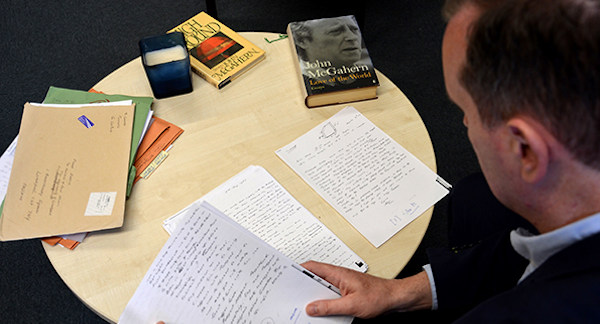The Letters of John McGahern and the Undergraduate Research Scheme
Posted on: 23 July 2020 by Lauren Price and Richard Snowden-Leak in 2020 posts

The Undergraduate Research Scheme gave students Lauren Price and Richard Snowden-Leak the opportunity to work closely for a two week period with Professor Frank Shovlin of the Institute of Irish Studies on his major project, The Letters of John McGahern, providing them with a more intimate insight into one of Ireland’s most important literary figures.
We heard about the project through Frank Shovlin himself, the convenor of the second-year module, ‘Banned: Fiction, Sex and the Limits of Decency’. His passion and enthusiasm for the novelist greatly piqued our own interests. One of the books on the module curriculum was McGahern’s 1965 novel, The Dark, and we were both struck by how tightly written, complex, and deeply disturbing this story was, so much so that McGahern himself became a figure of intrigue. What was he like, who were his friends, what did he do for fun? Many questions came to us in waves, and, thankfully, Frank gave us the opportunity to seek out these answers.
The project mainly consisted of transcribing interviews between Frank and people who had been well-acquainted with John, including the Dublin journalist Joe Kennedy; American magazine editor DeWitt Henry; former teaching colleagues Donal and Dolores Cleary; American publisher Jonathan Coleman, and, of course, John’s wife, Madeline, who typed up many of John’s finest works.
These interviews were highly informative about numerous aspects of McGahern’s life: the interviewees shone light on a very trying time when he was dismissed from the primary school he worked at following the publication of The Dark; they discussed John’s first marriage too, another troubling period in his life that affected him deeply. But they also gave little anecdotal details that presented John as not only a gentle and kind person, but also a very funny and witty one.
In addition to this, we enjoyed performing some smaller tasks, including writing a match report on a football game attended by John and Madeline, and finding newspaper articles and book reviews that would be of interest to Frank. The articles were a mixture of positive and negative responses to the writer’s literary works and gave us a better overview of the books we have not read yet.
Transcribing these interviews taught us two things: the value of research, and the value of depth in that research. Considering we’re both going on to do dissertations in third year — both of us focusing our projects around a single author — it was tremendously useful to see how the events of a person’s life can shape their work and their art. John, for instance, fictionalised the school where he was dismissed from in The Leavetaking, and without knowing more about his life at that school, and about the guilt and the torment he subsequently felt in being dismissed, certain insights are unattainable.
In a similar fashion to Holden Caulfield in The Catcher in the Rye, when one reads a good book, you want to have a chat with said author; research is a way of doing that, and more. You get to learn the language of their life and how events shaped their personality and style, making them who they are.
Discover more
Study in the Institute of Irish Studies.
Find out more about the Undergraduate Research Scheme (intranet)
We understand that this is a worrying and uncertain time for everyone, and the wellbeing of our students is our highest priority.
The University is here to offer you support and guidance as you continue with your studies. Please check your University email account daily so that you can continue to access advice and support from your module tutors regarding the shift to online teaching and alternative assessments.
The School will communicate with you regularly in response to students’ key concerns. Information is also available on our Coronavirus advice and guidance pages.
However, if you are have a specific query that you are unable to find the answer to online, please contact either your Academic Advisor or the Student Support Centre at hlcenq@liverpool.ac.uk
Keywords: undergraduate research scheme, research, john mcgahern, literature, letters, frank shovlin, research, student.